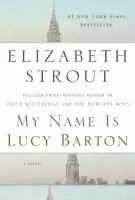
“I write because I want the reader to read the book when they may need it… even if they didn’t know they needed it,” says Elizabeth Strout, author of “My Name is Lucy Barton”, in a New York Times article. I read Strout’s book exactly when I needed it. “My Name is Lucy Barton” is a superbly told story about the relationship between a mother and daughter that deals with the knowledge that what happens to us as children marks us for life. And, as Christen Fisher, a member of the library’s fiction book group pointed out in our last meeting, if you’re paying attention, you’ll see that it is also a master class for writing a novel.
The first person narrator, Lucy, is a writer and her story unravels as part of the one she writes as her own book. It’s not as confusing as it sounds; actually, combined with Strout’s choice of using a hospital visit in which her long estranged mother comes to visit, it’s a bit brilliant. Pieces of the past and present are revealed with pointed subtlety and precision. Through the unraveling, a mentor of Lucy’s, author Sarah Payne, provides writing insight. While discussing this at the library’s book group, Fisher pulled at least ten extremely valuable tips for writers. Revisiting the text, I think I’ve pulled the same ones, and, maybe one more.
- You must be ruthless (advice from Jeremy, another character in the novel).
- Do not ever think you are better than someone (from Lucy’s sixth grade teacher, Mr. Haley).
- If there is a weakness in your story, address it head-on, take it in your teeth and address it, before the reader really knows. This is where you will get your authority.
- Be accurate.
- Go to the page without judgment.
- Anyone who uses their training to put someone down… is just a big old piece of crap.
- If you find yourself protecting anyone as you’re writing, you’re not doing it right.
- Never ever defend your work.
- The job of a writer of fiction is to report on the human condition, to tell us who we are and what we think and what we do.
- Go to the page with a heart as open as the heart of God.
- You will have only one story. You’ll write your story many ways. Don’t ever worry about story. You have only one.
Whether or not you consider yourself a writer, I bet you’d gain something valuable by picking up Strout’s latest work. It’s one of those books that makes you feel full: full of reflection, appreciation, wisdom, and maybe, just maybe a desire to piece together your own story. Unfortunately, I won’t be able to attend Beyond Words, the Friends of the Library’s September 17 benefit featuring Elizabeth Strout, but, hopefully, you will. Fill me in the next time you stop by the library. I’m sure you’ll be the wiser for it.
